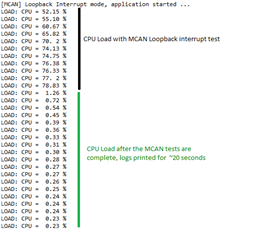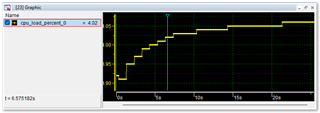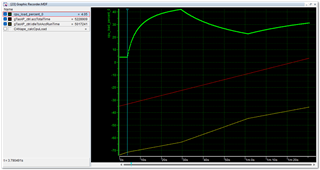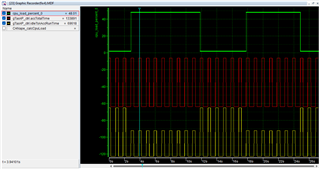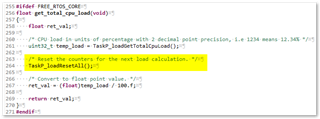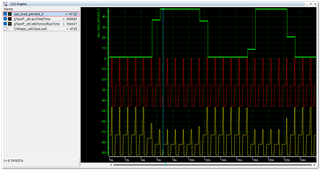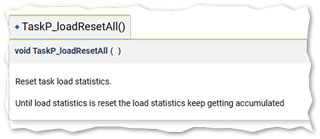Tool/software:
Hello,
I'm reading the value of TaskP_loadGetTotalCpuLoad() in two cores at 1s intervals. configGENERATE_RUN_TIME_STATS=1. The FreeRTOS is from SDK 09_02_00_56.
Core 0 has FreeRTOS with some CAN code but not much else. Core 3 has only FreeRTOS with some tasks scheduled.
The problem is that the CPU load calculation is heavily filtered. It takes about a minute to reach a steady value. Is there any way I can tweak it to respond more quickly? I don't mind a bit of noise.
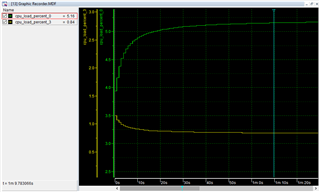
Here's the FreeRTOS config file:
/*
* Copyright (C) 2018-2021 Texas Instruments Incorporated
*
* Redistribution and use in source and binary forms, with or without
* modification, are permitted provided that the following conditions
* are met:
*
* Redistributions of source code must retain the above copyright
* notice, this list of conditions and the following disclaimer.
*
* Redistributions in binary form must reproduce the above copyright
* notice, this list of conditions and the following disclaimer in the
* documentation and/or other materials provided with the
* distribution.
*
* Neither the name of Texas Instruments Incorporated nor the names of
* its contributors may be used to endorse or promote products derived
* from this software without specific prior written permission.
*
* THIS SOFTWARE IS PROVIDED BY THE COPYRIGHT HOLDERS AND CONTRIBUTORS
* "AS IS" AND ANY EXPRESS OR IMPLIED WARRANTIES, INCLUDING, BUT NOT
* LIMITED TO, THE IMPLIED WARRANTIES OF MERCHANTABILITY AND FITNESS FOR
* A PARTICULAR PURPOSE ARE DISCLAIMED. IN NO EVENT SHALL THE COPYRIGHT
* OWNER OR CONTRIBUTORS BE LIABLE FOR ANY DIRECT, INDIRECT, INCIDENTAL,
* SPECIAL, EXEMPLARY, OR CONSEQUENTIAL DAMAGES (INCLUDING, BUT NOT
* LIMITED TO, PROCUREMENT OF SUBSTITUTE GOODS OR SERVICES; LOSS OF USE,
* DATA, OR PROFITS; OR BUSINESS INTERRUPTION) HOWEVER CAUSED AND ON ANY
* THEORY OF LIABILITY, WHETHER IN CONTRACT, STRICT LIABILITY, OR TORT
* (INCLUDING NEGLIGENCE OR OTHERWISE) ARISING IN ANY WAY OUT OF THE USE
* OF THIS SOFTWARE, EVEN IF ADVISED OF THE POSSIBILITY OF SUCH DAMAGE.
*/
#ifndef TI_FREERTOS_CONFIG_H
#define TI_FREERTOS_CONFIG_H
#ifdef __cplusplus
extern "C"
{
#endif
#include <kernel/dpl/DebugP.h>
/*-----------------------------------------------------------
* Application specific definitions.
*
* These definitions should be adjusted for your particular hardware and
* application requirements.
*
* THESE PARAMETERS ARE DESCRIBED WITHIN THE 'CONFIGURATION' SECTION OF THE
* FreeRTOS API DOCUMENTATION AVAILABLE ON THE FreeRTOS.org WEB SITE AND IN THE
* FreeRTOS REFERENCE MANUAL.
*----------------------------------------------------------*/
/* Keep below as 1 if the most optimized task switching latency is needed.
* This disables tracing, logging, assert and other error checks.
* So unless every last cycle of task switching is important leave this as 0.
*
* This is not a FreeRTOS defined config and is defined by TI to quickly switch
* between optimized and not-so-optimized config
*/
#define configOPTIMIZE_FOR_LATENCY (0)
#define configUSE_PREEMPTION (1)
#define configUSE_PORT_OPTIMISED_TASK_SELECTION (0)
#define configUSE_TICKLESS_IDLE (1)
#define configUSE_IDLE_HOOK (1) /* when 1, make sure to implement void vApplicationIdleHook(void) as the hook function */
#define configUSE_MALLOC_FAILED_HOOK (0)
#define configUSE_DAEMON_TASK_STARTUP_HOOK (0)
#define configUSE_TICK_HOOK (0)
#define configCPU_CLOCK_HZ (0) /* NOT USED in TI ports */
#define configSYSTICK_CLOCK_HZ (0) /* NOT USED in TI ports */
#define configTICK_RATE_HZ (10000)
#define configMAX_PRIORITIES (32)
#define configMINIMAL_STACK_SIZE (1024) /* in units of configSTACK_DEPTH_TYPE, not bytes */
#define configMAX_TASK_NAME_LEN (32)
#define configUSE_TRACE_FACILITY (1)
#if (configOPTIMIZE_FOR_LATENCY==0)
#define configUSE_STATS_FORMATTING_FUNCTIONS (1)
#else
#define configUSE_STATS_FORMATTING_FUNCTIONS (0)
#endif
#define configUSE_16_BIT_TICKS (0)
#define configIDLE_SHOULD_YIELD (1)
#define configUSE_TASK_NOTIFICATIONS (1)
#define configTASK_NOTIFICATION_ARRAY_ENTRIES (1)
#define configUSE_MUTEXES (1)
#define configUSE_RECURSIVE_MUTEXES (1)
#define configUSE_COUNTING_SEMAPHORES (1)
#define configUSE_ALTERNATIVE_API (0)
/* when = 1, Need to provied below,
* void vApplicationStackOverflowHook( TaskHandle_t xTask,
* char *pcTaskName );
*/
#if (configOPTIMIZE_FOR_LATENCY==0)
#define configCHECK_FOR_STACK_OVERFLOW (1)
#else
#define configCHECK_FOR_STACK_OVERFLOW (0)
#endif
#define configQUEUE_REGISTRY_SIZE (32)
#define configUSE_QUEUE_SETS (0)
#define configUSE_TIME_SLICING (0) /* keep as 0 to get same functionality as SysBIOS6 */
#define configUSE_NEWLIB_REENTRANT (0)
#define configENABLE_BACKWARD_COMPATIBILITY (1)
#define configNUM_THREAD_LOCAL_STORAGE_POINTERS (4)
#define configSTACK_DEPTH_TYPE UBaseType_t
#define configMESSAGE_BUFFER_LENGTH_TYPE size_t
#define configSUPPORT_STATIC_ALLOCATION (1) /* when = 1, need to provide below,
*
* void vApplicationGetTimerTaskMemory( StaticTask_t **ppxTimerTaskTCBBuffer,
* StackType_t **ppxTimerTaskStackBuffer,
* uint32_t *pulTimerTaskStackSize );
*
* void vApplicationGetIdleTaskMemory( StaticTask_t **ppxIdleTaskTCBBuffer,
* StackType_t **ppxIdleTaskStackBuffer,
* uint32_t *pulIdleTaskStackSize );
*/
#define configSUPPORT_DYNAMIC_ALLOCATION (1)
#define configTOTAL_HEAP_SIZE (4*1024) /* not used when heap_3.c is the selected heap */
#define configAPPLICATION_ALLOCATED_HEAP (0)
/* run-time stats config */
#if (configOPTIMIZE_FOR_LATENCY==0)
#define configGENERATE_RUN_TIME_STATS (1)
#else
#define configGENERATE_RUN_TIME_STATS (0)
#endif
void vPortConfigTimerForRunTimeStats();
#define portCONFIGURE_TIMER_FOR_RUN_TIME_STATS() vPortConfigTimerForRunTimeStats()
uint32_t uiPortGetRunTimeCounterValue();
#define portGET_RUN_TIME_COUNTER_VALUE() uiPortGetRunTimeCounterValue()
/* co-routine related config */
#define configUSE_CO_ROUTINES (0)
#define configMAX_CO_ROUTINE_PRIORITIES (0)
/* timer related config */
#define configUSE_TIMERS (1)
#define configTIMER_TASK_PRIORITY (configMAX_PRIORITIES - 1)
#define configTIMER_QUEUE_LENGTH (16)
#define configTIMER_TASK_STACK_DEPTH (256)
/* used in M4F & R5F, not applicable in C66x, A53 */
#define configMAX_SYSCALL_INTERRUPT_PRIORITY (0x4U)
/* used in M4F, not applicable in R5F, C66x, A53 */
#define configKERNEL_INTERRUPT_PRIORITY (configMAX_SYSCALL_INTERRUPT_PRIORITY)
#define configMAX_API_CALL_INTERRUPT_PRIORITY (configMAX_SYSCALL_INTERRUPT_PRIORITY)
#if (configOPTIMIZE_FOR_LATENCY==0)
#define configASSERT(x) DebugP_assert( (uint32_t)(x))
#endif
/* MPU aware FreeRTOS, not supported as TI */
#define configINCLUDE_APPLICATION_DEFINED_PRIVILEGED_FUNCTIONS (0)
#define configTOTAL_MPU_REGIONS (0)
#undef configTEX_S_C_B_FLASH
#undef configTEX_S_C_B_SRAM
#define configENFORCE_SYSTEM_CALLS_FROM_KERNEL_ONLY (0)
/* defines need for FreeRTOS+POSIX*/
#define configUSE_POSIX_ERRNO (1)
#define configUSE_APPLICATION_TASK_TAG (1)
/* include specific functions */
#define INCLUDE_vTaskDelete (1)
#define INCLUDE_vTaskDelay (1)
#define INCLUDE_vTaskSuspend (1)
#define INCLUDE_xTimerDelete (1)
#define INCLUDE_vSemaphoreDelete (1)
#define INCLUDE_xTimerPendFunctionCall (1)
#define INCLUDE_xTaskGetIdleTaskHandle (1)
#define INCLUDE_xTaskDelayUntil (1)
#ifdef __cplusplus
}
#endif
#endif /* TI_FREERTOS_CONFIG_H */
Thank you.


